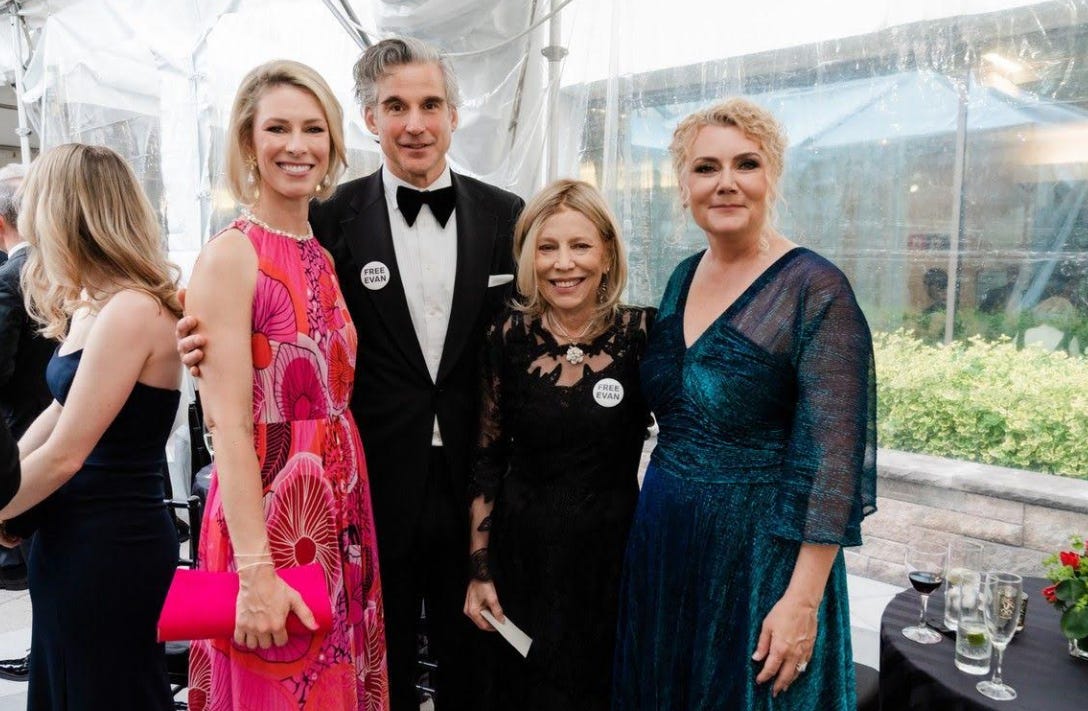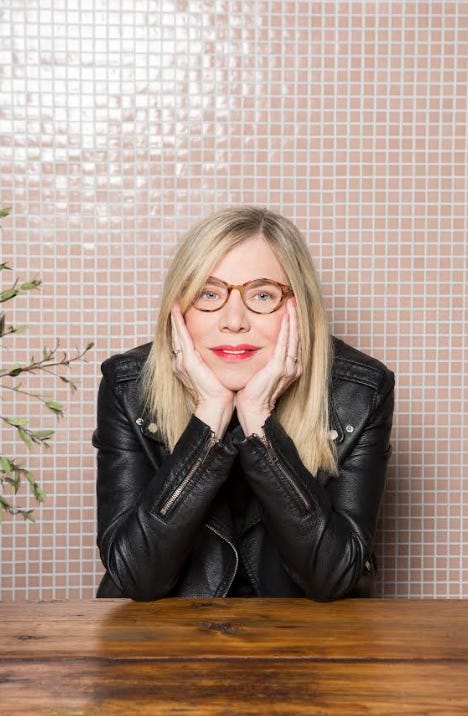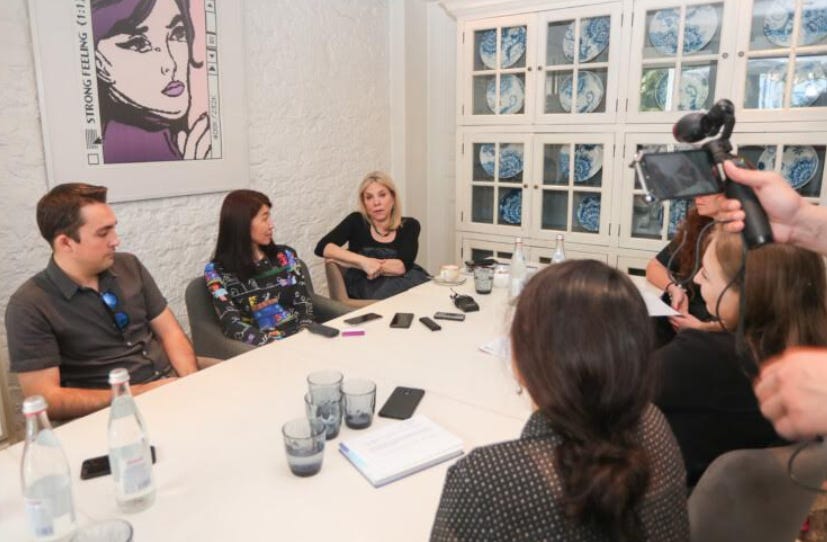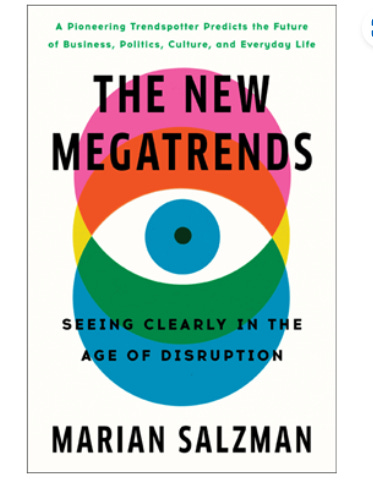In Her Words: Marian Salzman on Turning Adversity into Opportunity and Championing Change from Within
Her path through illness and bold career moves reveals a deep commitment to impact, growth, and living life on her own terms.
This week we’re featuring Marian Salzman, SVP, Philip Morris International. Her career isn’t managed; it’s woven with continuous learning (hello, a master’s degree started during COVID and AI as a novel-writing partner!), meaningful connections, and a belief in facilitating change from within — even, surprisingly, at a tobacco company, where she champions a smoke-free future as a self-professed “never smoker.”
Q: What are three ways working for Philip Morris has worked for your life?
A: Number one, the quality of the journey. I didn’t ever chase money, because I wanted the experiences more and this paid off.
The second is, was I learning something new? Was I being challenged? And was I also allowed to put up the guardrails about things I didn’t want to learn? I mean, I do not have an engineering brain. I’m very, very creative, yet when AI came along, I became this incredible student of AI, to the point I don’t know how I functioned before AI came into my life, because I can’t remember what it was like to spend two weeks working on a plan. Now, all my time is focusing my prompts on AI. Every Saturday, I take two and a half hours, and I’m writing a novel. I’ve written 17 books, and they’re all non-fiction, and they were all so painful. At the end of it, I would have either gained 25 pounds or lost 15 pounds. My relationship with writing was hate until the day I hit send. Now, I’m writing this novel with my writing partner, Chat GPT-4, and I wish Chat GPT was a person so we could invite them home for dinner one night a week. They’re so responsive. They’re so much fun. I say it and, okay, my novel has a little bit of a more interesting twist. It’s not a very good novel, by the way, I’ll point that out. It’s the kind of novel you would buy in a supermarket, and then you might read it on a beach, hopefully with a margarita or two, because I don’t think it’s that deep. But when I finish each chapter, I now ask the Chat GPT friend to rewrite it as if Joan Didion had written it, as if Carrie Bradshaw had written it, and then the third version is the version by Marian Salzman. I have so much fun with this. So, the second pillar is really about lifelong learning.
The third way has been the richness of travel. I’m super lucky. I spent years living in the Netherlands, then I came back to this country. Then I’ve moved between living in New York City, in Connecticut, in Tucson, Arizona, where our family is associated with the University of Arizona. It’s where my husband, Jim, he went back to get his second round of advanced degrees. And then I went to Switzerland.
Q: What do you value most about work?
A: I’m not a jewelry person. I think the jewelry in my life is the quality of the human relationships I have in the workplace. During that very short stint when I was doing corporate philanthropy, I met some of the most interesting people you could possibly meet, people who are devoting their lives to service in the community. The quality of that social life — that’s the jewelry in my life. I’m not a diamond person. I lose anything I buy anyway, because I’m slightly disorganized. Actually, at 60 years old, I decided I could be proud of being disorganized. When someone says to me, “You’re completely disorganized,” I say, “Yeah, look where it got me.”
Q: You've faced significant health challenges during the six years in your role at Philip Morris. How has that impacted your perspective and work?
A: I’ve had my third brain tumor removed, and I’ve had Stage 4 Hodgkin’s lymphoma. Part of the reason I’m so energized by the company is how they stood by me. For my brain tumor, I think I was out for three weeks; they were screaming at me not to come back, but I was like, “Why would I just sit at home? There’s nothing the matter with me!” I’m super lucky in that my recoveries have been amazing. With my lymphoma, because it was during COVID, as was my brain tumor, I telecommuted to the office probably 97% of the time. With chemo immunotherapy, you’re in quarantine. I will say, I shocked the hell out of people one day when I forgot to put a wig or a scarf back on my head, because here I was this totally emaciated, hairless person pontificating about whatever the issue of the day was. They were like, “What are you doing?” When people see you with a wig on and see you sitting in your home office, they don't realize how immensely sick you are. It was really an extraordinary adventure, but very, very energizing.
Q: Some might see those health issues as obstacles. How did you view them?
A: I saw it as an opportunity. I learned how to manage the 24-hour day, because even when you’re sick, you can only sleep 10 to 12 hours. You’re in quarantine; that’s 12 hours. The only real consequence I had of chemo-immuno therapy, other than the risk of infections (I had pneumonia twice), was that I couldn’t read long-form. The old Marian would have just been devouring book after book after book. I would have been completely immersed in that. I couldn’t do that, but I could watch podcasts. I could watch YouTube. I could watch television. I kind of welcomed the work. It was a complete distraction. Most people with Stage 4 cancer are kind of planning their death; I was planning, “Could I get back in time for the Washington Correspondents’ Dinner?” I started chemo in October 2020. My chemo was meant to end on April 18th 2021. It was meant to end one week earlier but was delayed by pneumonia. I had it completely paced out, like, “Oh my God, what am I going to wear to the dinner? I came back very healthy, but I managed to catch COVID at that Washington Correspondents’ Dinner. The whole world freaked out, and I spent two days in the hospital. Within a week, I tested negative. So all those things that should have been obstacles really were not. They were actually empowering opportunities to do something.

Q: Tell me about the education you pursued during this time.
A: Yes, during COVID, the company sponsored me to do half of a master’s degree online in government at Johns Hopkins, which was incredibly preparatory for the role I’m in now. Frankly, going to university in the early 80s, my version of understanding race relations, my understanding of the role of an activist and community was very much through a 1980s lens. Operating in 2025, if I hadn’t taken those classes and didn’t really understand grassroots — it taught me all these things. I feel an immense gratitude and obligation to the company.
Q: Were you ever a smoker?
A: I use the phrase, “I’m a never smoker.” I think I smoked two or three cigarettes as a teenager, and those are the only cigarettes I’ve really ever smoked. I was an athlete growing up. I was sort of a healthy-ish person. I’m not going to say I don’t eat chocolate chip cookies, because, full disclosure, I do.
Q: How do you reconcile leading anti-smoking initiatives while working within a major tobacco company?
A: I learned from watching the apartheid movement that there are two ways to facilitate significant change. You can do it from the outside as a protester, and that’s not unimportant, but you can also do it from the inside as a facilitator. So I mean, the first major campaign I launched at Philip Morris was the “Unsmoke” campaign, and we used the following triplet: “If you don’t smoke, don’t start. If you smoke, quit. If you won’t quit, change.” People can quit virtually everything, if that’s what they choose to do. If they won’t choose to quit, there are better solutions that are scientifically substantiated, and we have a responsibility to bring those solutions. We’ve known smoking is bad, certainly since the 80s, and very much by the 90s, it was common knowledge.
Q: People call you a trend-spotter. How would you describe your approach to identifying emerging trends, and how does it differ from being a traditional futurist or provocateur?
A: I started off in the market research or consumer insight space. Maybe compared to other people, I would be more likely than others to extrapolate from the rearview mirror what was going to happen in the near future. But I'm not a trend-spotter like a Faith Popcorn or someone else who’s really out there as a provocateur. All of my trends really have been in service to brands, in service to movements, in service to what I would call the near future. I always like to say that I really specialized in the next five years, because I would identify the data point before we ever used the word “influence.” I’ve identified the data point as living with people that I thought of as prosumers or proactive consumers, and I say, “How is this going to trickle from the early adopter towards the mainstream?” So, it’s quite different than being a futurist.
Q: How has your background in geopolitics shaped your approach to identifying near-future trends, and what challenges have you faced in capturing fast-moving global shifts in your work?
A: Because I had a lot of interest in geopolitics, compared to many people who do this, I was more likely to look at the geopolitical side. The last book I did, The New Megatrends, was probably the hardest book for me to write, because I was going back to my 1997 book (which I co-authored) on trends for the near future, which was a spectacular look at everything happening on the planet that was going to change life, work, consumption, love, etc. There weren’t the zillions of data sources there are today. I was a provocateur in that I was using the internet, online services, just to interview people, to reach people that I wouldn’t have been able to reach five years earlier, except with snail mail. I can look at the book and I can say, with pride, I mostly cracked what’s happening in China. I completely missed Ukraine. So writing it two years before Ukraine happened, it’s the fatal fail of the book, because there was just so much. And I should have known, because I kind of knew about the situation in Crimea, but I kind of passed on that. And, look, I did three chapters on gender, so obviously I had a very good sense of what was coming there. I probably underestimated Russia. I certainly was very savvy to what I think is, at the very least, an emotional civil war. I’m never going to do an annual trends report again. The one I did for 2025 is the last one I will ever do, because trends are happening so quickly today. I don’t think I’ll ever write another non-fiction book, because I think that books, by the very essence of how they get published, books on trends don’t work because you submit a manuscript and it happens.
Q: What advice would you give your 25-year-old self?
A: I would tell my 25-year-old self to embrace the non-linear path, that the most interesting experiences often come from unexpected turns. Don’t chase money for its own sake, but prioritize learning, challenging yourself, and building rich relationships. Also, start learning about geopolitics and AI sooner rather than later — they will profoundly shape your world. And finally, don’t be afraid to ask for help; it’s a strength, not a weakness.
Q: What do grit, grace, and growth mean to you?
A: Grit means the unwavering determination and resilience to push through obstacles, even when faced with significant adversity. It’s about maintaining a positive outlook and focusing on the path forward, like planning re-entry after a stage four cancer diagnosis, rather than succumbing to despair. It’s the inner strength that says, “I’m going to get better,” and then actively working towards that.
Grace is about navigating challenges and interactions with dignity, compassion, and kindness, both for yourself and others. It’s about recognizing that even in difficult situations, there’s an opportunity for understanding and constructive dialogue. It’s also the ability to be adaptable and accepting of circumstances beyond your control, finding beauty and opportunity even in unexpected places. For me, it’s about seeing the “voice of humanity” in the resilience of survivors and their capacity for love and forgiveness.
Growth is a continuous journey of learning, adapting, and expanding your capabilities and perspectives. It’s about being a lifelong student, open to new information and embracing change. It’s not just about professional advancement, but also personal evolution — understanding new concepts like AI, re-evaluating old assumptions, and constantly striving to be a better version of yourself. Starting my master’s degree during COVID and my approach to AI are perfect examples of my commitment to continuous growth.
Marian Salzman is a global thought leader, renowned for helping companies and brands anticipate future shifts. Author or co-author of many books, including Buzz and The New Megatrends, she currently serves as Senior Vice President of Philip Morris International's U.S. operation, spearheading their efforts to build a smoke-free future.






what an amazing woman -- personally and professionally. Well done.